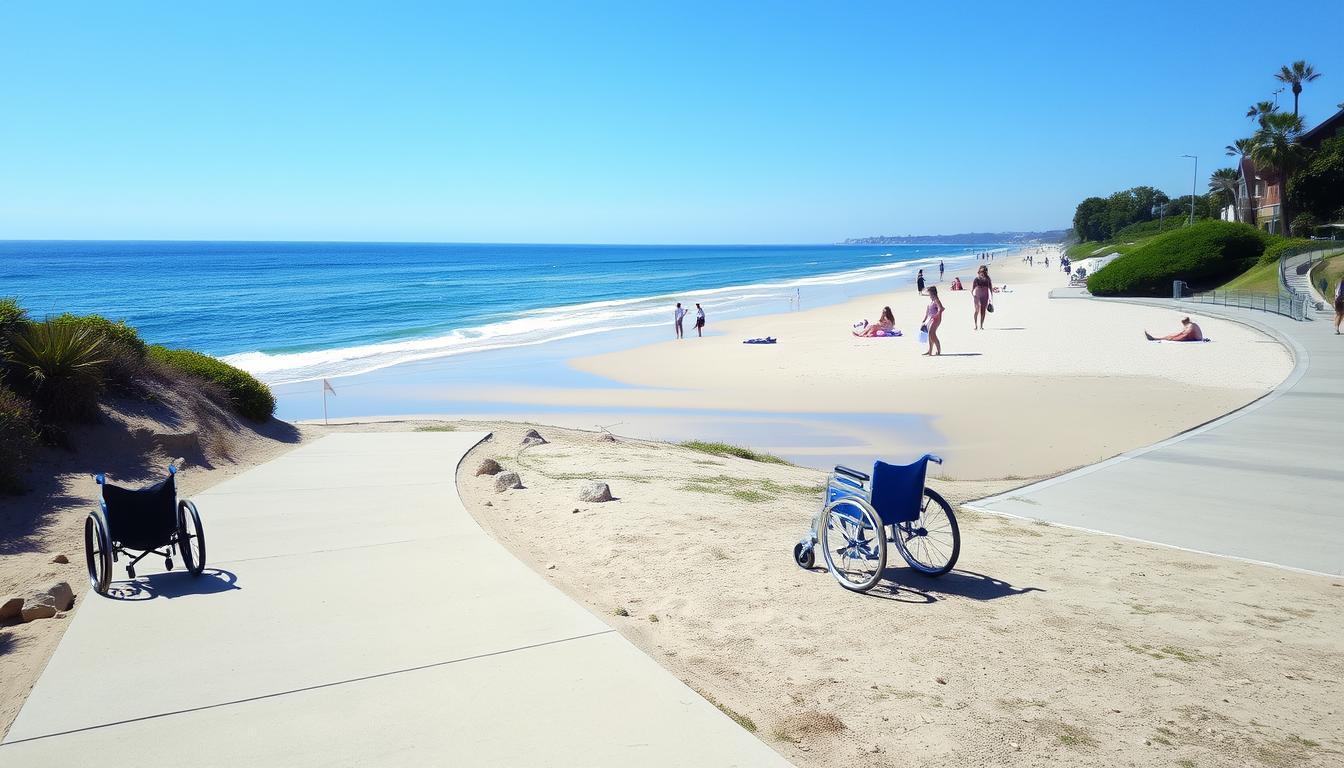Traveling with physical disabilities is different. It needs careful planning and knowing what to expect. You must think about how to get around and where to stay. You also need the right gear.
It’s important to check if places are easy to get to. Make sure your hotel is okay for you. Plan your trip with your needs in mind. And remember, you have rights.
Getting the right equipment, like small wheelchairs, can help a lot. Look for places that know how to help people with disabilities. This way, you can travel with confidence.
Key Takeaways
- Planning is crucial for successful accessible travel
- Verify hotel and transportation accessibility beforehand
- Use adaptive equipment rentals to aid in mobility
- Be aware of and exercise your disability rights
- Consult travel agents specializing in inclusive tourism
- Create an itinerary with accessibility as a priority
- Understand service animal policies if applicable
Understanding Disability Accommodations
When planning a trip for people with physical disabilities, it’s key to check if places meet their needs. Look into hotel accessibility and talk to airlines about special services. This can make a big difference in their travel experience.
Research Hotel Accessibility
Before you book, find out if hotels are wheelchair-friendly. Many hotels show off their accessible features. These include entry ramps, wide doors, and special shower setups.
| Hotel Accessibility Features | Description |
|---|---|
| Entry Ramps | Ensures smooth access to all facilities within the hotel. |
| Widened Doorways | Facilitates easy movement for wheelchair users. |
| Accessible Showers | Features such as grab bars and roll-in showers enhance bathroom accessibility. |
| Hearing-Impaired Alert Systems | Visual and vibrating alerts for alarms and notifications promote safety and comfort. |
Contact Airlines in Advance
People with physical disabilities should talk to airlines early. This ensures they get the help they need, like boarding help and safe handling of their mobility aids. Talking about your needs ahead of time can avoid problems on the day of travel.
Planning Your Trip
Planning your trip well is key for a fun and easy journey. You should think about the places you want to visit, how you can get there, and what you need. This way, you can enjoy your trip more and face fewer problems.

Create an Itinerary with Accessibility in Mind
To make a great travel plan, follow these tips:
- Research Your Destination: Look up what’s accessible at places you’ll visit, like restaurants and buses.
- Plan Your Routes: Choose easy paths by using online maps and local tips.
- Schedule Rest Periods: Make sure to rest and take breaks in your plan.
- Backup Plans: Have a plan B if some things aren’t as easy to do as you thought.
Consult with a Travel Agent Specializing in Inclusive Tourism
Working with a travel agent who knows about inclusive tourism can make your trip better. They know how to plan trips that fit your needs. They can help find the best places to stay, how to get around, and fun things to do.
| Steps | Description |
|---|---|
| Initial Consultation | Talk about what you need and want with the agent to start planning. |
| Customized Itinerary | Get a travel plan made just for you that meets your needs. |
| Accessibility Resources | Find out about local help, rentals, and support groups. |
| Final Adjustments | Check and change your plan as needed to make it perfect for you. |
Choosing Wheelchair-Friendly Destinations
Choosing places that are easy for wheelchairs is key to a good trip. You can see cities or nature spots. It’s important to find places with things that everyone can enjoy.
Vancouver, Canada, is great for wheelchair users. It has buses and SkyTrain with ramps and elevators. Barcelona, Spain, also has easy paths and ramps at attractions.
- Vancouver, Canada: This city is very welcoming. You can visit Stanley Park, Granville Island, and the Vancouver Aquarium easily. The public transport is wheelchair-friendly.
- Barcelona, Spain: Barcelona is perfect for a European trip. It has easy paths and ramps at places like the Sagrada Familia and Park Güell.
- Melbourne, Australia: Melbourne is very inclusive. It has easy transport, parks, and places like the Royal Botanic Gardens and Federation Square.
Disneyland in California is great for people with disabilities. It has special rooms and services. This makes everyone’s visit better.
Colorado Springs, USA, is good for outdoor fans. It has trails like Garden of the Gods that are easy to get around.
Japan is working hard to make travel easy for everyone. Train stations have ramps and signs. Places like Tokyo Disneyland and Kyoto Imperial Palace are also easy to get to.
“Choosing places that are easy for wheelchairs makes traveling better. It lets everyone enjoy their trip more.”
Essential Mobility Aids for Travel
Traveling with physical disabilities is easier with the right aids. Having the right tools makes your trip better. Here’s what you need to know:
Compact and Lightweight Wheelchairs
Lightweight wheelchairs are key for those who want to travel alone. These travel-friendly wheelchairs are easy to carry. They are perfect for planes, trains, or buses.
They are strong and easy to use. This makes moving around and switching places easy.
Travel-Friendly Walking Aids
Lightweight walking aids are also crucial. They help with balance and moving without being too heavy. They are great for packing and using on the go.
There are many types like foldable canes and small walkers. They offer support wherever you are.
Here’s a look at some top lightweight wheelchairs and walking aids:
| Mobility Aid | Features | Price Range |
|---|---|---|
| Wheelchair A | Ultra Lightweight, Foldable, Durable Frame | $300 – $450 |
| Wheelchair B | Compact, Easy to Transport, Padded Seat | $500 – $700 |
| Walking Aid X | Collapsible, Adjustable Height, Sturdy Build | $50 – $80 |
| Walking Aid Y | Lightweight, Non-Slip Grip, Travel-Friendly | $80 – $120 |
Picking the right mobility aids makes travel better. Quality travel-friendly wheelchairs and lightweight walking aids give you freedom. You can enjoy your trips more.
Understanding Service Animal Policies
Traveling with disability service animals can be tough without knowing service animal policies. It’s key to grasp the rules and papers needed for airlines, hotels, and places you visit.

Studies show 20% of travelers with physical disabilities face problems because of service animal policies. Knowing the rules for each part of your trip is crucial. For instance, 6 out of 10 people need help understanding airline regulations for service animals.
Getting ready means learning about airline regulations for service animals. You need to know what papers and notice you must give. This can make boarding easier for you and your animal.
Also, disability service animals must follow strict rules at places to stay. It’s said that 40% of travelers have trouble at hotels because of policy misunderstandings. Having the right papers and knowing the hotel’s rules can prevent these issues.
Here are some key steps for a smooth trip:
- Look up airline regulations for service animals early and get the needed papers ready.
- Call places to stay to check their service animal policies.
- Learn about the laws and rules of your destination for disability service animals.
By knowing service animal policies and tackling problems ahead of time, you can have a worry-free trip for you and your service animal.
10 Tips for Traveling With Physical Disabilities
Traveling with physical disabilities can be easy with the right tips. We have 10 tips to help you travel well. These tips will make your journey smooth and fun.
- Research and Plan Ahead: Find out if your destination is wheelchair-friendly. Look for hotels and attractions that are easy to get to.
- Consult a Specialist: Talk to a travel agent who knows about accessible travel. They can help plan your trip.
- Prepare Documentation: Bring all your medical papers and prescriptions. This is important for your health while traveling.
- Pre-Book Special Assistance: Tell airlines and trains about your needs early. Ask for help like easy boarding or seats.
- Adapt Transportation: Get travel-friendly wheelchairs or walking aids. They make moving around easier.
- Stay Informed About Disability Rights: Know your rights in the places you visit. This ensures you get the help you need.
- Pack Smartly: Pack only what you need. Include your medicines, aids, and daily items.
- Use Technology: Use apps to find places and services that are easy to get to.
- Practice Self-Care: Keep your health up by following your routine. Don’t push yourself too hard. Rest when you need to.
- Stay Positive and Flexible: Keep a good mood and be ready to change plans. Being flexible makes travel better.
Here’s a table to help you plan your trip. It shows what to do and how to do it.
| Strategy | Action |
|---|---|
| Research and Plan Ahead | Check accessibility reviews, visit websites, and contact destinations directly |
| Consult a Specialist | Hire a travel agent specializing in inclusive tourism |
| Prepare Documentation | Ensure all medical documents are up-to-date and packed |
| Pre-Book Special Assistance | Contact travel providers to request necessary accommodations |
| Adapt Transportation | Use mobility aids suitable for travel |
| Stay Informed About Disability Rights | Research rights and regulations at your destination |
| Pack Smartly | Focus on essential items suited to your needs |
| Use Technology | Download apps that assist in finding accessible locations |
| Practice Self-Care | Maintain health routines, take breaks, and rest as needed |
| Stay Positive and Flexible | Be adaptable and maintain a good attitude in face of challenges |
Conclusion
Traveling with a disability can be a success with good planning and the right help. Many people with physical disabilities find it hard to get around in places like airports. They also need special help while traveling.
Traveling with a disability costs more than for people without disabilities. This shows how important it is to plan well to have a smooth trip.
To make travel better, find places that are easy to get around. Use travel agents who know about accessible trips. They can help with things like small wheelchairs and easy-to-use walking aids.
Not all hotels are easy for everyone to get to. So, it’s key to research before you go.
Travelers with disabilities can have amazing trips with the right help. Use the right accommodations and know about service animals. Follow the ten tips given to make your trip unforgettable.
Traveling with a disability is not just about getting there. It’s about making memories that last a lifetime.
FAQ
What are the most important tips for accessible travel?
For accessible travel, plan well before you go. Pick places that are easy for wheelchairs. Talk to experts in inclusive tourism.
Make sure your hotel and travel are okay for you. Know the rules for service animals too.
How can I ensure my hotel meets my accessibility needs?
Look for hotels with ramps, wide doors, and easy showers. They should also have alerts for the deaf. Call the hotel to check these things.
What steps should I take when booking a flight with a physical disability?
Call the airline early to get help with boarding and bags. Check their rules for wheelchairs and service animals. This makes flying easier.
How do I create an accessible itinerary?
Plan your trip with accessibility in mind. Choose places with easy attractions and transport. A travel agent can help make it perfect for you.
What destinations are known for being wheelchair-friendly?
Places like Amsterdam, Barcelona, and Sydney are great for wheelchairs. They have easy attractions and good transport.
What mobility aids are recommended for travel?
Take a small, light wheelchair for travel. It’s easy to carry. Also, bring walking aids for support and freedom.
What should I know about traveling with a service animal?
Learn about airline rules for service animals. Know what papers you need. This avoids problems on your trip.
What is the overall travel strategy for individuals with physical disabilities?
Plan well and use special equipment rentals. Know your rights and get advice from experts. This makes your trip enjoyable and easy.



